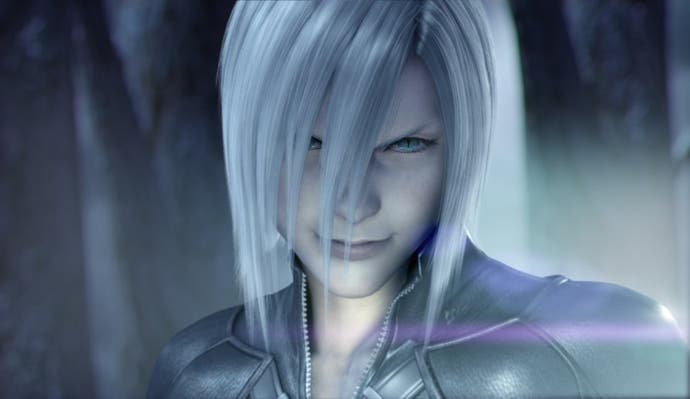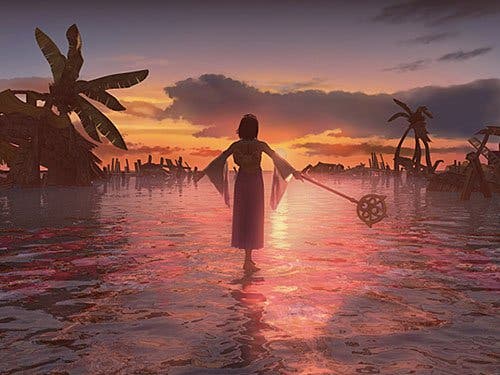Dear Friends: Music from Final Fantasy
Eurogamer reviews a concert performance. Wonders will truly never cease.

If there's one thing that Final Fantasy composer Nobuo Uematsu certainly does, it's divide opinion. The work of the prolific musician, whose accomplishments range from some of the best-known melodic chirps of the NES era through to dramatic choral arrangements on PlayStation titles and even the penning of a massively successful pop single for Hong Kong idol Faye Wong, inspires the kind of reverence from fans that invites Internet forum flame wars like flowerbeds attract honeybees. One need only view the comments thread on Eurogamer's interview with the man last month to see that there's little truth in the old adage about music calming the savage beast.
Whichever side of the "Uematsu debate" you happen to fall on, though, there's no arguing that his achievements aren't significant. From his origins in an era when videogame music was incredibly limited by console hardware, the development of Uematsu's craft has happened hand in hand with the advancement of game audio as a whole - and we could count on the fingers of one hand the game composers who are considered as accomplished and influential, or even simply as commercially successful, as the man whose sounds have given texture and passion to the Final Fantasy series for nearly two decades.
The man who walked out in front of an almost sell-out crowd at the Masonic Auditorium in San Francisco this week didn't look like a colossus at the forefront of a new field of music. Dressed in casual traditional Japanese clothes, Uematsu isn't what you might call avant garde - spectacles and untidy hair that's greying at the temples top off a bristling moustache. He's no rock star - but the mere act of walking into the hall to find his seat before the third ever live performance of his music in North America earned him a rock star's welcome.
We Europeans may be consistently amused by the willingness of our American brethren to applaud and cheer for just about anything (although it certainly gets tiresome at E3, as every lame duck and tired franchise update is greeted with cries of "awesome!"), but Uematsu's entrance was no normal over-excited round of applause. Halfway around the planet from his native Japan, this composer of classical music was greeted with a standing ovation before a note of his compositions had been played, and what an ovation - replete with shouts, cheers and whistles that you'd expect at a football match or a stadium rock gig, not in the refined surroundings of a classical auditorium with a symphony orchestra warming up. Uematsu beamed, waved and shouted "thank you" through cupped hands; the musicians didn't know whether to look amused or shocked, at first. They'd probably never played before an audience like this before - enthusiastic, excited, international and predominantly under 30. To my left were a young couple aged around 16, from a local school, who'd never been to a classical performance. To my right, a group of teenaged boys in jeans and football jerseys. Ahead of me, some older men and women in rather more appropriate symphony clothes - jackets and evening dresses. Music fans or Final Fantasy fans? Both, they confided.

The lights went down. A few words were spoken by the director of the Game Developers Conference, the raison d'etre for this San Francisco concert - and then Uematsu's music took centre stage, as the concert kicked off with the stirring choral piece Liberi Fatali, the opening theme of Final Fantasy VIII, before launching into a wide-ranging and varied set of tracks drawn from across the decades. The Dear Friends line-up is a good selection for any fan of Uematsu's work; it focuses slightly on the more delicate love themes than on the upbeat battle music, but that's more appropriate for a symphonic suite anyway, and it's certainly not that he's unafraid to let rip with the more powerful themes.
Indeed, the concert was bookended with arguably his most sonorous tracks, with FFVIII's Liberi Fatali providing the opening and FFVII's superbly dramatic One-Winged Angel, another strong choral piece, slotted in as the inevitable encore. Of the two, Liberi Fatali was perhaps slightly disappointing, with the choir struggling to belt out their parts with sufficient power and the whole song feeling a little thin and light, but all was forgiven by their stunning performance with One-Winged Angel, the opening bars of which were greeted with a roar of approval from the crowd (most un-symphony like behaviour, but you couldn't help but grin and be swept along by the rock gig style enthusiasm of the crowd) and the choral sections of which boomed around the hall and sent electric shivers down the spines of the listeners.
Twelve other tracks were played as part of the near two-hour-long concert, and there were obvious stand-out tracks among them, such as FFVII's Aeris' Theme, which was rich with emotion and complexity, FFVI's Terra's Theme, a stirring, throaty melody that is an excellent demonstration of Uematsu's talent for weaving delicate trills and soft wind sections into more powerful themes, and FFIX's Vamo' Alla Flamenco, a joyous Latin rhythm overture which was one of two tracks to feature a guitar as a key instrument and provided a sharp contrast to much of the rest of the music.
Although it would be wrong to classify any of the tracks as being particularly weak, it's interesting that Uematsu's symphonic compositions seem to work best when he's revisiting his earlier works rather than adapting more recent melodies. Perhaps it's merely that familiarity breeds a certain degree of contempt - FFX's Zanarkand is a beautiful piece of music, both haunting and triumphant, while FFXI's Ronfaure is a stirring martial piece, but neither seemed as interesting as his arrangements of tracks which originally appeared on the SNES - particularly the aforementioned Terra's Theme (FFVI) and FFIV's wonderful Theme of Love, which opened with a beautiful wind section with a deft, light touch, and gradually progressed into more complex and deep melodies as the string section joined in. This theme, Uematsu informed us in a short talk after the concert, is now set to feature in some Japanese music textbooks. It's not hard to see why.

Of course, Uematsu's achievements as a musician are, in part, a reflection of the achievements of the Final Fantasy team as a whole. Young men and women who have never been into a classical concert hall in their lives wouldn't travel hundreds of miles to see the music of a Japanese composer if Final Fantasy hadn't introduced it to them in the first place, and as musically accomplished as they are, there's no denying that each one was greeted so enthusiastically because of what they represent, as much as what they are.
Excellent music aside, the audience loved Zanarkand because to them, it evokes Tidus' tragic journey. Vamo Alla Flamenco represents the joy of adventuring with Zidane, Vivi and company, while Love Grows reminds players of Squall and Rinoa's awkward, stilted romance, and as for the rapturous reception for One-Winged Angel... Well, One-Winged Angel is the most dramatic and emotionally charged showdown in videogame history, bar none. Being an Uematsu fan and a Final Fantasy fan are inextricably entwined, because the music and the stories are themselves entwined. As such, while it was nice to hear a new composition from Advent Children as part of the program, it was the weakest part - because we simply don't have images and characters to associate with that music just yet.
The concert wasn't without its problems. Musically, it was unquestionably good - reservations regarding the ability of the choir and symphony to provide the power needed by Uematsu's triumphant flourishes dogged the first few tracks, but the musicians got into their stride quickly and my misgivings on this score evaporated in the second half of the concert. However, the presentation was, frankly, a bit cack-handed. Whoever decided that because the audience was going to be full of young men (although actually, the female contingent was sizeable), it would be a great idea to get a daft and entirely unknown bimbo from a US NBA TV show to act as "mistress of ceremonies" should never be let within 100 metres of a concert hall ever again. Where a proper MC would perhaps have given a little insight into each piece of music and allowed it to take centre stage, this self-confessed non-gamer - who didn't look much like a huge fan of symphonic music either - read blatantly and slowly from a set of cue cards, fluffed the pre-scripted terrible jokes and tried to get cheers for groan-worthy innuendo. Even the American audience could only manage a polite scattering of applause when she took her final bow.
Also poor was the decision to project images from each game on screens above the orchestra while they performed - not a bad idea in theory, but simply taking unedited cut-scenes and projecting them with no regard for their relevance to the music being played was both pointless and jarring. One aspect that did work well, though, was a short talk from Uematsu himself at the end of the performance - where the composer's humour and intelligence shone through, even past the language barrier, and his genuine delight at the reception his work has received abroad was very evident.
Simply getting to see the spectacle of a symphony auditorium packed full of teenagers who would look more at home at a Linkin Park gig was worth turning up for. Watching one of videogames' most talented musicians perform to the kind of audience that "serious" composers wring their hands over, complaining of a lack of interest from young people in their music, was frankly a beautiful thing, even for something of a classical music philistine like myself - and Uematsu's powerful, soaring themes and delicate, complex melodies, given the warmth and depth that you can only get at a live performance, were everything I, or the audience, could have hoped for.
Only one question remains.
When are we going to see Uematsu bring his burgeoning tour to visit his "Dear Friends" here in Europe? We can only hope that plans are afoot.

